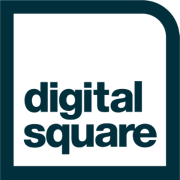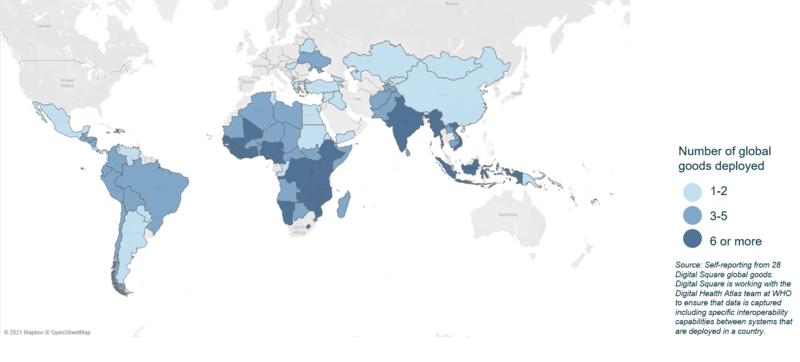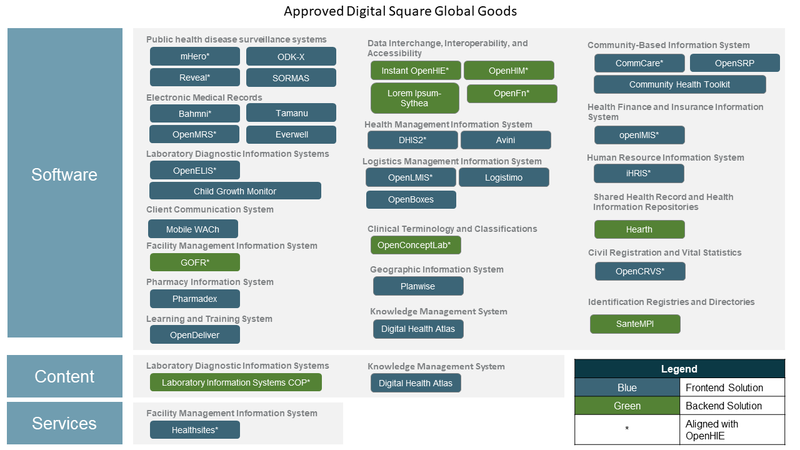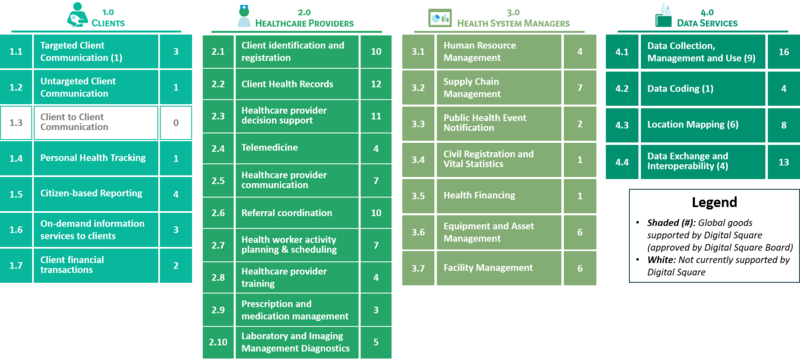Main Page
Digital Square is a digital health marketplace (or 'square') where supply and demand come together to accelerate health equity. We connect health leaders with the resources necessary for digital transformation. Digital Square is housed at PATH, and supported by USAID, the Bill & Melinda Gates Foundation, and a consortium of other donors.
This wiki serves as a platform for technical audiences to obtain resources and information related to Digital Square's investments in global goods. More general information about Digital Square can be found on the main website.
COVID-19 Response
Digital Square is leveraging its unique role and strengths to support countries, donors, and partners in the response to the COVID-19 pandemic. Harnessing existing relationships across the global digital health ecosystem, we mobilize our robust network of partners in coordinated response. We also utilize PATH's work in global health security, malaria, primary health care, and the broader digital and data portfolio to more comprehensively support country partners in ensuring essential health services remain available Read our full capability statement here.
Visit the COVID-19 page on this wiki to learn more about how global goods are supporting pandemic response and access a range of available resources.
Visit the Global goods and vaccinations to learn more about how global goods are supporting COVID-19 vaccine introduction.
Digital Square Information
What We Do
Digital Square addresses the need for a thriving marketplace for health.
We work in three key ways:
- Identify promising investment opportunities and provides operational support to streamline procurement
- Promote the development, adoption, and reuse of digital health global goods, and helps increase their availability, adaptability, and maturity
- Elevate country priorities and strengthen regional and national digital health capacity
Governance
Digital Square's investments follow detailed governance processes that leverage a Peer Review Committee, Board, and Investment Review Committee. Additionally, Digital Square serves as the Secretariat for DIAL's Health-Sustainability Advisory Group.
Investors
Digital Square is funded in partnership with USAID, the Bill & Melinda Gates Foundation, and a consortium of other donors. A full list can be found on the Digital Square website.
Global Goods
Global Goods are digital health tools that are adaptable to different countries and contexts. There are three types of global goods:
- Software: A software tool that is free and open source (FOSS), and used to manage, analyze, or transmit health-related data, with proven utility in several settings.
- Services: A software tool that is used to manage, transmit, or analyze health-related data that can be freely accessed as a software service and adheres to open data principles.
- Content A resource, toolkit, or data standard that is available under an open license and that is used to improve or analyze health data management processes.
A mature digital health software global good is software that is Free and Open Source Software (FOSS), is supported by a strong community, has a clear governance structure, is funded by multiple sources, has been deployed at significant scale, is used across multiple countries, has demonstrated effectiveness, is designed to be interoperable, and is an emergent standard application.
About Digital Square Global Goods
Approved global goods include those which have submitted applications in response to a Notice. These include applications for specific work packages in response to a Notice. The applications are reviewed by the Digital Square Peer Review Committee and Investment Review Committee. The Digital Square Board approves the applications, or partial application work packages. An "Approved Digital Square Global Good" is not a formally vetted global good. Approved Digital Square global goods cover nearly all of the World Health Organization Digital Health Intervention Classifications. Many global goods are adaptable to support multiple interventions.
Read more:
Presence of global goods in countries
Digital Square Investments in Global Goods
Approved Digital Square global goods
Investment Processes
The Global Goods Community
Global Good Resources
Alignment with other mechanisms
UNICEF/WHO Digital Health Center of Excellence (DICE)
Many countries do not have fully functioning digital systems or solutions required to address health and information systems priorities in the context of the COVID-19 pandemic, as well as post-pandemic health systems’ needs. Digital Square and the newly formed UNICEF/WHO Digital Health Center of Excellence (DICE) are proactively looking for opportunities to collaborate to support countries’ wanting to invest in sustainable and scalable deployments of carefully chosen digital solutions for COVID-19 pandemic response plans. DICE is committed to supporting countries harness appropriate digital public goods, many of which are mature and already integrated into national systems, to provide substantial multilayered support to the COVID-19 pandemic using a health system strengthening lens; from planning distribution of commodities and vaccines, tracking supplies, surveillance and case detection, monitoring coverage of services, and communicating to generate demand and reduce misinformation. . Digital Square’s Mission is to connect health leaders with the resources they need for digital transformation. Through our collective partnership, we aim to not only support country needs now, but also to help country leaders build stronger, more sustainable digital systems, which will improve health outcomes beyond the current pandemic.”
Digital Public Goods Alliance & the WHO Digital Clearing House
Digital Square is closely coordinating with the Digital Public Goods Alliance (DPGA), a multi-stakeholder initiative co-hosted by UNICEF and the Government of Norway, and the technical leads at the WHO Clearinghouse, to align the global goods and digital public goods approval processes for health solutions. Though there are differences in criteria across these initiatives, there are opportunities for alignment that have the potential to accelerate the discovery and adoption of global goods. While efforts are underway to align these processes, several points have been agreed upon:
- Digital Public Goods are defined by the UN Secretary-General as open source software, open data, open AI models, open standards and open content that adhere to privacy and other applicable laws and best practices, do no harm, and help attain the SDGs. This definition is operationalized through a nine-indicator open standard that projects must meet. The DPG Standard does not assess the scale, funding sources, country deployments, or other indicators of a “mature” global good.
- Within the context of health, software global goods are considered a mature subset of DPGs. Digital Square and the DPGA are currently working to align processes so that health-related software Global Goods approved through Digital Square also meet the DPG Standard.
- Both Digital Square global goods and DPGs must be open source. The WHO Clearinghouse will include proprietary solutions mapped to specific use cases.
- Digital Square nor the WHO Clearinghouse certify global goods. The DPGA reviews digital solutions against the DPG standard, and approves them as digital public goods.
- While the majority of global goods will meet the DPG Standard required to be approved as a digital public good, there are two reasons why not all DPGs will be software global goods:
- Digital Square exclusively evaluates solutions relevant to the health sector whereas DPGs are sector agnostic.
- Digital Square facilitates a peer review process that assess maturity and aligns and weighs in on “awarding” the title of Digital Square approved global good. In contrast, DPGs have no maturity requirement.
- Digital Square, WHO and the DPGA will be piloting the application of the combined standards for DPGs and global goods to identify and assess promising short-listed projects of high relevance for immunization delivery management as part of the Community of Practice (CoP) for Digital Health convened by the DPGA and cochaired by UNICEF Health.
- In future iterations of this Global Goods Guidebook, Digital Square will note which global goods are DPGs and which use cases have been approved through the WHO Clearinghouse. The DPG Registry will also note which DPGs are Digital Square approved global goods. Digital Square, the DPGA, and the WHO Clearinghouse will continue to cross reference respective “approvals” of global goods.
The goal for creating alignment and collaboration across these institutions is to better empower country governments, donors and digital tool implementers with a clear understanding of which digital public goods are evaluated by technical expert entities and which digital public goods are recommended based on these criteria. Digital Square, the DPGA, and WHO are fully aligned in the belief that digital health solutions and services are critical for creating a more equitable world. By aligning efforts, these entities are better able to increase the discovery, adoption and support for the high-quality tools that are most needed to ensure better health outcomes for all.
More Information
- Understanding the Relationship between Digital Public Goods and Global Goods in the Context of Digital Health
- Presentation from the December 2020 Global Digital Health Forum: GDHF 2020 Presentation on Aligning Global Public Goods: How WHO, UNICEF and Digital Square are coordinating for the digital health community (slides)
- Presentation from the April 2021 Global Digital Development Forum: Navigating how to choose and use from different resources which track Global Goods (slides)
External Resources
- Principles for Digital Development
- The Mobile Economy 2018
- The Mobile Economy Sub-Saharan Africa 2017
- Scaling Digital Health in Emerging Markets
- The latest case study on a mHealth service in Tanzania: Healthy Pregnancy, Healthy Baby
Digital Square Resources
- Partner Resources
- Grants and Contracts Basics
- Market Maturity Methodology
- Navigator for Digital Health Capability Models
Digital Health & Interoperability Working Group
The Digital Health & Interoperability Working Group (DH&I WG) is a volunteer community of practice dedicated to strengthening country health systems and outcomes through the appropriate and responsible use of digital information technologies.
Digital Health Applied Leadership Program
Since 2018, the digital health community has been developing a shared vision for digital health capacity strengthening. From the WHO/ITU workshop held in Lesotho in 2018 through a six-month global consultation process, governments' specific needs were established. With support from a consortium of advisors, including the WHO, and support from the Bill & Melinda Gates Foundation, PEPFAR, USAID, and the McGovern Foundation, Digital Square began work on a new initiative called the Digital Health Applied Leadership Program (DHALP).
The DHALP aims to advance the skills and capabilities of country-level digital health practitioners and stakeholders—strengthening the ability for ministries to own and lead digital transformation efforts. With a blended learning approach and a focus on relationship building, the DHALP takes a holistic view of country practitioners' skills and knowledge to drive digital transformation.
DHALP Resources
- Announcing the Digital Health Applied Leadership Program (web article)
- Needs Assessment Presentation
Contact Us
- Slack: Please join our slack team
About
Digital Square is a PATH-led initiative funded and designed by the United States Agency of International Development, the Bill & Melinda Gates Foundation, and a consortium of other donors.
The Digital Square wiki is made possible by the generous support of the American people through the United States Agency for International Development. The contents are the responsibility of PATH and do not necessarily reflect the views of USAID or the United States Government.




